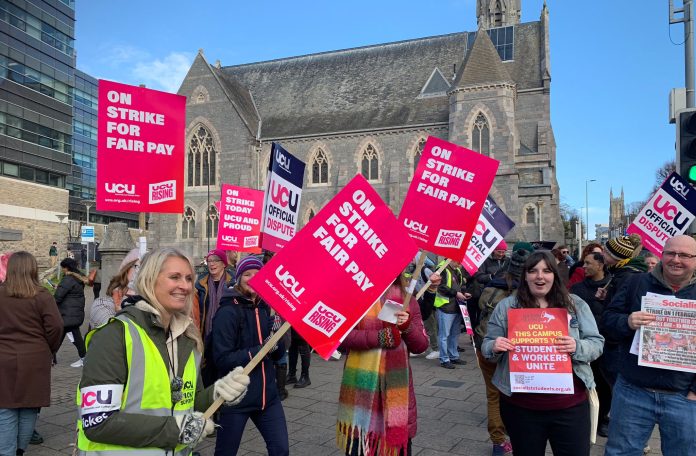Bea Gardner UCU member
On 15 March, a University and College Union (UCU) strike day, when thousands of members were participating in Budget Day demonstrations, UCU HQ released the much-anticipated details of the employers’ latest offers in the two ongoing disputes, over USS pensions and over pay and conditions. The announcement came in the form of an hour-long podcast with an 18-page transcript.
The proposals were the outcome of the “intensive negotiations” which were used as justification for the undemocratic “pausing” of strike action, during which time the employers announced they would be imposing the pay element of the dispute.
15 March was supposed to be the relaunch of action following the pause, giving a strong showing to the employer that we would not accept the imposition of a pay award we had previously rejected.
Instead, the action scheduled for 20-22 March was left uncertain following the announcement, during which the general secretary Jo Grady did the employers’ job of trying to convince members this was as good a deal as we could get.
The bold, sector-wide strike action UCU has taken this academic year has had an impact. We have pushed the employers into talks they had refused to enter into previously. The employers agree that pension benefits should be restored and that a better valuation mechanism is needed. They have recognised that casualisation is a significant issue for university staff and that, as a national body, the University and Colleges Employers Association (UCEA) can do something about it.
However, the offers deliver no concrete commitments on any of the issues in the disputes. In the pay dispute, there are no improvements on the pay offer that members rejected by 80% earlier in the year. On the issues of workload, casualisation and equality we only have agreed terms for further talks. Notably, another higher education union, Unison, has rejected the pay offer and announced it would move to a strike ballot.
Though there are more promising developments in the pensions dispute, nothing is binding and the details rest on the outcome of the next valuation.
We can push the employers much further if we can unite over a strategy for further action which escalates into the summer term and coordinates with the other campus unions.
At the same time as the proposals were announced, UCU HQ launched a snap consultation of members and branches in the form of an “informal e-ballot”, with a branch delegates meeting on 16 March. This side-lined the elected lay leadership of the union, including the Higher Education Committee (HEC) which would normally have first oversight of a deal and decide if it was ready to go out for a member vote. Its members had not been given details on the offer before Grady’s 15 March announcement, and neither had the union’s elected negotiators, who have been kept out of ACAS negotiations.
The branch delegate meeting voted in favour of members having a vote (54%), but not to pause the strikes (70%). In the e-ballot, in which just under half of the members involved in the disputes participated, there was a majority in favour of putting the offer to a vote and, because the two questions were rolled into one, to pause the strikes (67%).
The HEC then met, and decided not to suspend the strikes or to put the offer out to vote. It was correct to continue with the strike action scheduled for 20-22 March. But given these consultation results, in our view the HEC made a tactical mistake in deciding not to put the employers’ offer to members. The HEC decision, going against the views expressed in the consultation, may be used to try to undermine the body, the dispute, and the union as a whole.
A members’ vote, with discussion at emergency branch meetings in the workplaces, with time and space for full discussion, and a clear recommendation to ‘reject’ from the HEC, could have been used as part of uniting members over an agreed strategy to take the disputes forward.
Some HEC members have reported that they wanted to put separate votes to members over the pay and conditions, and pensions disputes, but that this was blocked by the union’s full-time apparatus.
The HEC and other elected lay leadership bodies must be able to exercise democratic control over the union and its disputes – including setting their own meeting agendas and instructing full-time officers in carrying out their tasks, including the union’s communications. The explanation for HEC decision-making should have gone out with the results; members should not have to seek this out for themselves on Twitter.
Socialist Party members in UCU back the decision to continue the scheduled strikes. The primary objective for the union must be to maintain the strength of the industrial action, and members’ confidence in the union as a whole.
Key in the immediate term is advancing a strategy for the disputes that can rebuild unity, and give confidence that we can sustain the action needed to push the employers further.
Achieving the 50% threshold in the current reballot is vital to enable the action to extend beyond our current mandate, which expires on 1 April. So are measures to support further action, including boosting the union’s fighting fund by making a serious appeal to the wider trade union movement.
Unison is moving to ballot on 2023-24 pay, having taken disaggregated action over the past year in the pay dispute. Working alongside the other unions and coordinating action is critical. Joint meetings of branch executives of both unions should be convened at campus level, but so too meetings of the sector executives of both unions nationally, to plan and coordinate the further action needed to take on university employers.








